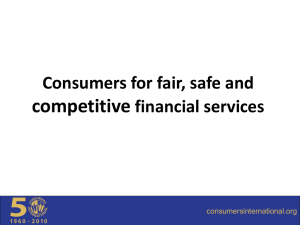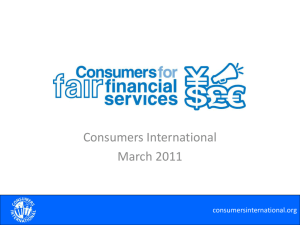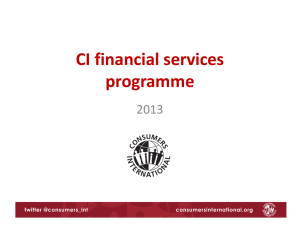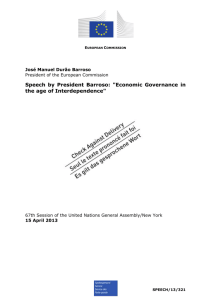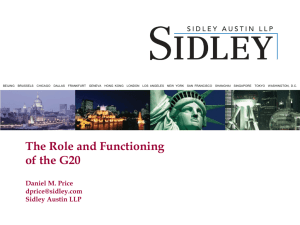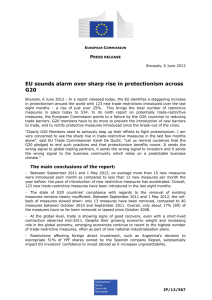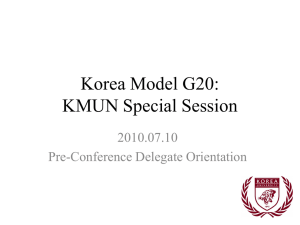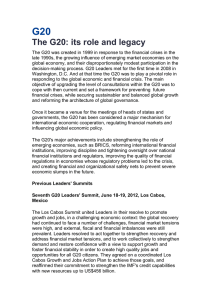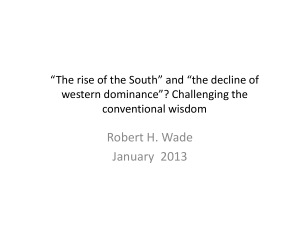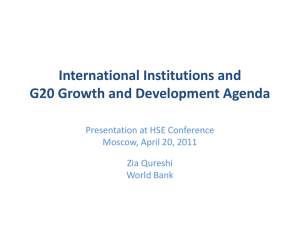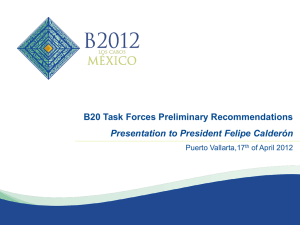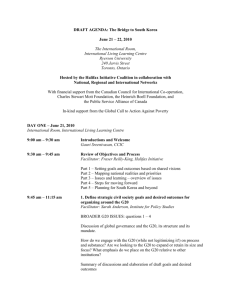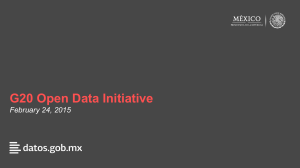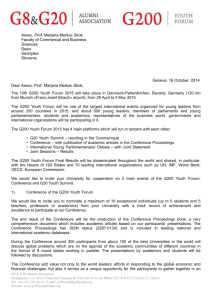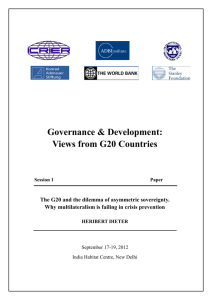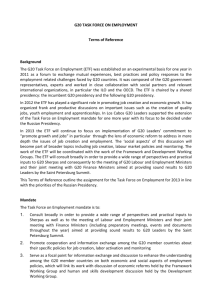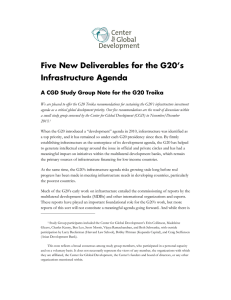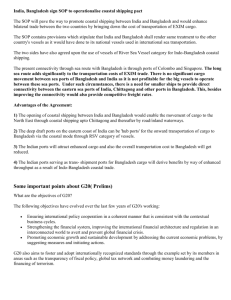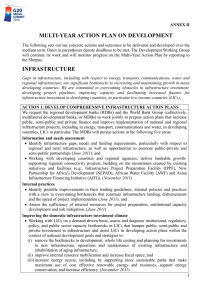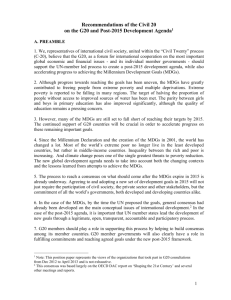October 27th, 2010 - Institute of Business Administration
advertisement
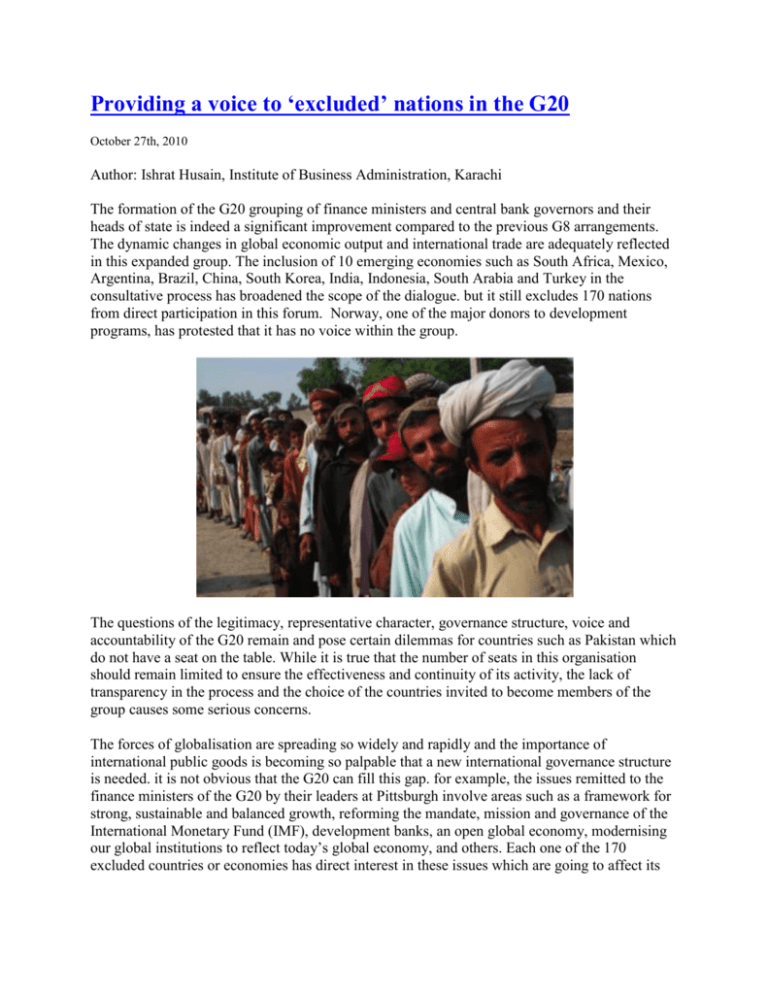
Providing a voice to ‘excluded’ nations in the G20 October 27th, 2010 Author: Ishrat Husain, Institute of Business Administration, Karachi The formation of the G20 grouping of finance ministers and central bank governors and their heads of state is indeed a significant improvement compared to the previous G8 arrangements. The dynamic changes in global economic output and international trade are adequately reflected in this expanded group. The inclusion of 10 emerging economies such as South Africa, Mexico, Argentina, Brazil, China, South Korea, India, Indonesia, South Arabia and Turkey in the consultative process has broadened the scope of the dialogue. but it still excludes 170 nations from direct participation in this forum. Norway, one of the major donors to development programs, has protested that it has no voice within the group. The questions of the legitimacy, representative character, governance structure, voice and accountability of the G20 remain and pose certain dilemmas for countries such as Pakistan which do not have a seat on the table. While it is true that the number of seats in this organisation should remain limited to ensure the effectiveness and continuity of its activity, the lack of transparency in the process and the choice of the countries invited to become members of the group causes some serious concerns. The forces of globalisation are spreading so widely and rapidly and the importance of international public goods is becoming so palpable that a new international governance structure is needed. it is not obvious that the G20 can fill this gap. for example, the issues remitted to the finance ministers of the G20 by their leaders at Pittsburgh involve areas such as a framework for strong, sustainable and balanced growth, reforming the mandate, mission and governance of the International Monetary Fund (IMF), development banks, an open global economy, modernising our global institutions to reflect today’s global economy, and others. Each one of the 170 excluded countries or economies has direct interest in these issues which are going to affect its future directly or indirectly. The interests of the majority of countries are neither taken into account nor given due weight in the decision-making process. Let us illustrate this problem with the example of Pakistan—the fifth most populous country in the world, enjoying the same per capita income as its next door neighbour, India. The size of the Indian economy is eight times that of Pakistan and naturally India, on the basis of its economic strength and dynamism, was invited to become a member of the G20. If the political relations between the two countries were cordial and there was a convergence of national economic interests then it is quite conceivable that Pakistan could use India as a proxy for its representation at G20 forums. But the fact that the two countries suffer from a serious ‘trust deficit’ precludes this particular possibility. Where does this leave Pakistan? Any reform of the IMF, or multilateral development banks or setting up of new global institutions would affect Pakistan. How does it ensure that no damage is inflicted upon it under any future arrangement and in fact it is a beneficiary of the decisions taken to reform global institutions? Assume that the composition of the IMF and the World Bank’s executive boards is altered, replacing nine of the 24 seats belonging to the European Union. Will this result in automatic takeover by the 10 members of the G20? Wouldn’t these countries argue that their economic prowess has already been established by their inclusion in the G20 and that therefore they are entitled to occupy the vacant seats? Won’t this platform be seen as a means of selfaggrandisement by some? In the WTO Doha Development Round there are multiple groups among the developing and emerging countries each trying to project and safeguard their own parochial interests. These groupings do not stay intact when the global climate change discussions take place. A new set of alliances, networks, groupings are constantly formed and dismantled depending on the nature of the problem. Similarly, the simple dichotomous relationship between the developed and eveloping countries has also lost its meaning. In some instances, some developed countries do align themselves with some developing countries and in other cases they stay together as a bloc with other developed countries in a multi-dimensional, multi-player environment, it is hard to predict which of the groupings or alliances would remain stable and for what period of time. The large eco-system has therefore become inherently unstable and therefore the governance structures such as the G20, with their selected, fixed sub-set of countries, are inadequate to address the requirements of the system. What are the options available to the excluded countries such as Pakistan to have a voice at the G20? One option is the formation of constituencies consisting of various countries, as is the case with the IMF and the World Bank boards. Representation on G20 forums from each constituency would be on a rotational basis for a fixed term. Each country can select a constituency of its own choice from among the developed and developing countries. The other option is that 20 countries already included in the G20 should have formal consultative mechanisms with clusters of excluded countries (associate countries) whereby they solicit their input and advice, represent and articulate the interests of their associate countries and keep them informed about the decision-making process. The above options, though not perfect, would overcome some of the apparent weaknesses of the existing arrangements. it will at least introduce transparency to the process of inclusion of countries, protect the interests of excluded countries, give a voice to the latter group and hold the membership accountable. Ishrat Husain is the Dean and Director of the Institute of Business Management, Karachi, and served as a Governor of Pakistan’s central bank from 1999 to 2005. This is an article from the most recent edition of the East Asia Forum Quarterly: ‘Asia and the G20’.
